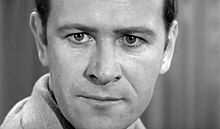Edward Judd
| Edward Judd | |
|---|---|
 Edward Judd in trailer to "The World Ten Times Over" (1963) | |
| Born |
4 October 1932 Shanghai, China |
| Died |
24 February 2009 (aged 76) Mitcham, Surrey, England, UK |
Cause of death | bronchial pneumonia |
| Years active | 1948-1992 |
| Spouse(s) |
Norma Ronald (1966-1993) (her death) 2 children Gene Anderson (?-1965) (her death) |
Edward Judd (4 October 1932 – 24 February 2009) was a British actor.
Born in Shanghai, China, he and his English father and Russian mother fled when the Japanese attacked China five years later.[1]
His career was at its peak in the 1960s, with a series of leading roles in British science fiction films, including The Day the Earth Caught Fire (1961 - a disaster film in which he played an alcoholic reporter during a time when ever larger nuclear explosions could alter the Earth's axis, propelling the Earth towards the sun), First Men in the Moon (1964), and Island of Terror (1966). As well as starring in these films, he worked as a soap opera actor and performed other character parts on television. His roles in these classic science fiction films were highly praised by audiences and critics alike. Judd was also famous for the 1975 "Think Once, Think Twice, Think Bike" campaign on making motorists aware of the risks faced on the road by motorcyclists.[2]
Judd appeared regularly on TV.[3]
Very little is known of his life after the 1970s. He was heard in an episode of the BBC Radio comedy Drop Me Here, Darling, starring Leslie Phillips, in 1983, as well as playing Barrymore in a televised version of The Hound of the Baskervilles the same year, and the BBC Radio play Philadelphia Moonshine in 1985. He appeared in the 1988 TV film Jack the Ripper as Thomas Arnold.
In the early 1970s, he lived in Cottenham Park Road, Wimbledon. During the 1970s and 1980s, Judd (known as Eddie to some friends, as evidenced in Michael Caine's 2011 autobiography) was a highly respected voice-over artist, used on many mainstream commercials recorded in the recording studios in London's Soho.[citation needed]
As of 1990, he lived in The Phoenix Hotel in Wimbledon and was a credit officer for a Canadian Investment bank. He lived at a retirement home in Mitcham in his last years.[1]
He was married twice; his first wife was Gene Anderson, who died in 1965.[4] His second wife was actress Norma Ronald, with whom he had two daughters.[5]
Selected filmography
- The Good Die Young (1954)
- Carry On Sergeant (1958)
- The Man Upstairs (1958)
- I Was Monty's Double (1958)
- No Safety Ahead (1959)
- Subway in the Sky (1959)
- The Criminal (1960)
- Sink the Bismarck! (1960)
- The Shakedown (1960)
- The Challenge (1960)
- The Day the Earth Caught Fire (1961)
- Mystery Submarine (1963)
- Stolen Hours (1963)
- The World Ten Times Over (1963)
- The Long Ships (1964)
- First Men in the Moon (1964)
- Strange Bedfellows (1965)
- Invasion (1965)
- Island of Terror (1966)
- The Vengeance of She (1968)
- Universal Soldier (1971)
- Living Free (1972)
- Because of the Cats (1973)
- The Vault of Horror (1973)
- O Lucky Man! (1973)
- Assassin (1973)
- Feelings (1974)
- The Incredible Sarah (1976)
- Flambards (1979)
- The Boys in Blue (1982)
- Night Train To Murder (1983)
- The Kitchen Toto (1987)
- Jack the Ripper (1988)
References
- ↑ 1.0 1.1 "Biography for Edward Judd". Internet Movie Database. Retrieved July 4, 2013.
- ↑ Judd, Edward (1975). "Think Bike". YouTube. Retrieved July 4, 2013.
- ↑ http://www.guardian.co.uk/film/2009/may/21/edward-judd-obituary-day-earth-caught-fire
- ↑ http://www.guardian.co.uk/film/2009/may/21/edward-judd-obituary-day-earth-caught-fire
- ↑ Obituary "Edward Judd: actor in sci-fi films, the West End and TV series", The Times, 9 March 2009.
External links
|